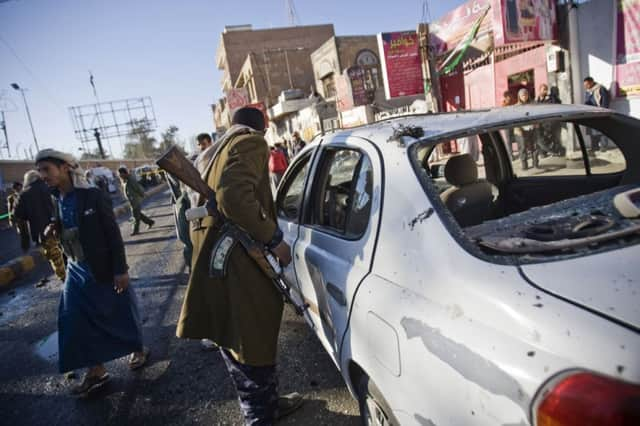Yemen: 35 police cadets die in bomb attack


No-one immediately claimed responsibility for the attack. Yemen’s local al-Qaeda branch, targeted in frequent US drone strikes, has carried out similar attacks in the past.
At the scene of the blast, the dead and wounded lay on a pavement against a wall. Water sprayed by firefighters to extinguish the blaze mixed with their pooled blood. A charred taxi cab smoked near what remained of the minibus, yards from a gate for the police academy, which is located in a residential area. The bomber struck as lines of cadets waited outside, preparing to enroll, witnesses said.
Advertisement
Hide AdAdvertisement
Hide Ad“We were all gathering and the bomber exploded right next to all of the police college classmates,” said Jamil al-Khaleedi. “It went off among all of them, and they flew through the air.”
The head of police in Sanaa, Abdul-Razak al-Moayed, said the bomber killed at least 35 people. Another security official said at least three civilians died in the blast.
The health ministry said 64 people were wounded by the explosion, which sent a large plume of smoke into the sky above a heavily congested part of the city near the central bank and defence ministry.
“The situation is catastrophic. We arrived to find bodies piled on top of each other,” a paramedic at the scene said as ambulances took casualties away.
A policeman said that another car had been passing as the bomb went off and was set on fire along with everyone inside.
The interior ministry said it was halting registration at the police college, which takes place every year, for a week.
The US embassy in Yemen condemned the attack, saying it showed the “nihilistic vision and depravity of terror groups operating in Yemen”.
Western and Gulf Arab countries fear further instability could weaken the country’s government, giving al-Qaeda in the Arabian Peninsula, one of the Sunni militant group’s most active wings, more space to plot attacks outside Yemen’s borders.
Advertisement
Hide AdAdvertisement
Hide AdYemen shares a long border with major oil exporter Saudi Arabia.
Yemen’s army has launched several concerted campaigns to dislodge al-Qaeda with the help of US drone strikes, but the militants have entrenched themselves in largely lawless parts of the Arabian Peninsula country, among sympathetic Sunni tribes.
There has been a hike in violence in Yemen recently after Shiite rebel militias took control of the capital and other cities in the latest upheaval after the country’s 2011 popular uprising which led to a change of government and splits in the army.
The rebels, known as Houthis, are challenging the government of President Abed Rabbo Mansour Hadi, demanding a greater share of power.
The critics of the Shiite rebels view them as a proxy for Shiite Iran, charges the rebels deny.
Tribal leaders and Yemeni officials warn that the rising power of the Shiite Houthis and the backlash over drone strikes has caused al-Qaeda to surge in strength and find new recruits.
The Houthis’ push into largely Sunni regions of central Yemen has pitted the rebels against Sunnis, to the benefit of Sunni al-Qaeda.
Washington considers al-Qaeda in Yemen, linked to several failed attacks in the US, the most dangerous branch of the terror network.